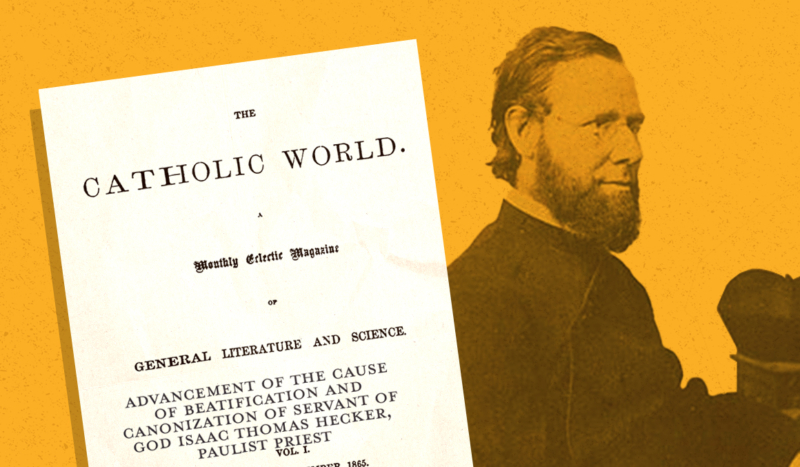
CV NEWS FEED // The U.S. bishops this week voted to move forward with the cause for canonization of Servant of God, Isaac Thomas Hecker, founder of the Paulist Fathers.
On November 14, at the USCCB’s annual Fall Plenary Assembly in Baltimore, 230 bishops voted to advance the cause of Hecker’s beatification and canonization on the diocesan level. Only seven bishops voted no, with two abstentions.
Archbishop Jerome Listecki of Milwaukee, chairman of the USCCB Committee on Canonical Affairs and Church Governance, along with Cardinal Timothy Dolan of New York, facilitated the bishops’ discussion about the cause.
“[Fr. Hecker’s] legacy and personal witness is especially known because of the Society of Apostolic Life he founded in the United States that is present in many of our dioceses,” Listecki said, referring to the Paulists.
Born in 1819 in New York City, Hecker’s life was a “classic American story,” according to Dolan:
son of immigrants, difficult childhood, raised by a single mother… After surviving smallpox as a child he worked his way through school while helping provide for his family. Seeing the plight of fellow New Yorkers, he became politically active, striving to eliminate poverty and injustice. But [Hecker] quickly became disillusioned with politics and began asking the bigger questions about God, about truth, about the purpose of life.”
Dolan described Hecker as a “modern-day Augustine,” whose heart was restless and
constantly searching. Hecker studied and visited various religious movements dominant in American society back in the 1830s, 1840s, and would have recognized himself in the many young people today who claim to be ‘spiritual but not religious.’ His openness to the truth soon brought him to reckon with the claims of Catholicism and here, the yearning of his heart met the rigor of his mind, and he found himself at home.
“Like those apostles on Pentecost Sunday, [Hecker] was on fire to share this with everyone. For the rest of his life, Isaac Hecker maintained a deep devotion to the Holy Spirit whom he trusted to guide his ministry,” Dolan continued.
Hecker was ordained a priest in 1848 after spending his novitiate with the Redemptorists.
In 1858, Hecker left the Redemptorists and founded the Missionary Society of St. Paul the Apostle, commonly known as the Paulist Fathers.
“His patron is well chosen,” Dolan said, “as Fr. Hecker set out like St. Paul the Apostle to win the world for Christ. He was a multimedia, even for the time, missionary in the parish missions that he preached so vigorously, in the lectures he delivered, in the books he published, the periodicals he founded, the countless columns he penned. Fr. Hecker worked tirelessly to proclaim the Word God.”
Dolan explained that Hecker had a “twofold purpose,” which was “to make the Catholic Faith appealing, accessible, and compelling, to a skeptical and at times hostile population, and then to educate, encourage Catholics in their own faith, enabling them to become ambassadors for Christ.”
During the Civil War, Hecker “resisted the polemical or controversial tone of some of his fellow apologists. Rather, he sought an apostolate of attraction, to propose the faith with clarity, color, and charity, always assuming the good will of those to whom he preached,” Dolan explained, adding that Hecker’s “efforts were animated by a deep sense of hope in the future of the United States of America.”
“Despite the divisions that at his time were tearing the country apart, Fr. Hecker believed that the Catholic Church was uniquely positioned to heal and unite the American people, reminding us all of our universal belonging to Christ,” Dolan continued:
In the face of the skeptical old world back in Europe, Fr. Hecker believed that America’s founding principles formed a fertile field for the faith. With the Church unfettered here in this republic to propose your beliefs in the marketplace of ideas, he had every confidence that the truth would prevail. His confidence and trust in the Holy Spirit, cast out all fear. This was not false optimism, but the conviction of faith, seen through the bright light of truth, the fire of love, convinced was he that the Holy Spirit renews the individual soul, and that the soul would help build up the Church, and the Church could then sanctify the world.
Hecker died in New York City in 1888 after battling numerous illnesses.
Dolan said Hecker’s faith should be an inspiration “as we strive to continue his own missionary work in this vineyard of America.”

